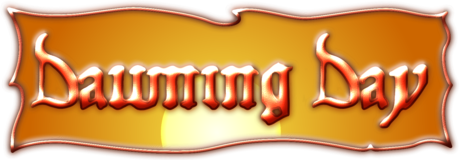About Dawning Day
Dawning Day is a campaign setting for fantasy roleplaying. It is built around the OGL 3.5 edition ruleset, the same system that powers some of the world’s most popular roleplaying games, and so it can be used as a setting for any of those games. (It could also be used for other rulesets, though you may find that some setting elements no longer fit so neatly as a result.)
A core design goal of Dawning Day is verisimilitude: the sense of being believable, of feeling realistic
despite being obviously unreal. Nothing in the setting should feel like it is there just because
, and there is great depth of detail to support you in building your character or your campaign however you like.
Why Dawning Day?
What does the world need with another campaign setting? And why would you want to use this one?
Dawning Day started life as a combination of bits and pieces of setting for campaign use, and a few opinion pieces. The OGL 3.5 edition ruleset has a few elements that many people think are inconsistent or illogical; and it’s always been the prerogative of a Games Master to change the rules to fit their own sense of aesthetics.
But then there are people who don’t just insist that this rule or that doesn’t make sense (to them), but that it cannot make sense (to anyone). I’ve spent quite a few words arguing against that, usually by describing a hypothetical setting where the rule in question did make sense, preferably without changing any other rule.
And when I pulled all these hypotheticals together, along with the aforementioned bits and pieces I’d been working out for a campaign, the setting that would become Dawning Day was born.
Of course, none of this explains why you should choose Dawning Day for your own campaign. Indeed, a setting where everything follows the rules as written would seem to be the very definition of a generic setting. What’s there to get your attention? What sets it apart from any other setting? I thought about this question for a while, taking into account the elements of backstory that I had been working on, and I found the answer.
Dawning Day is the anti-apocalyptic setting.
There are many settings that make some sort of cataclysm the centre of their premise. Civilisation has fallen, or is on the way to falling; the world is dying; a recent cataclysm has changed the course of history; or the powers of evil completely outmatch the defenders of good, if there are any.
The appeal is obvious: if nothing else, such a situation provides an easy explanation for any challenges that the heroes face. But just how much can the heroes change, really? Lots of settings claim to be a world where a hero can make a difference
, but is it true? If the world has met its doom or is hurtling towards it, does anything they do really make a difference
, or is it just a noble and tragic struggle to the very end? Don’t get me wrong, there’s a lot of worth in that trope. But it’s been done.
Dawning Day takes a different approach. Here, the apocalypse was averted. The Shadow War and the Darkened Sun were disastrous events, to be sure, but the world avoided an immeasurably worse disaster. This is not an after-the-end setting where the survivors must eke out a bare existence; the victors of the Shadow War didn’t just survive, they triumphed.
But that doesn’t mean the world is now a happy utopia where good has won and evil is banished. On the contrary: it means that life has changed from battling against a single overwhelming peril, to a wide-open world of opportunities. The future is a blank slate on which anyone can make a mark—and many are competing to do so. Nor has evil been destroyed; the single greatest evil the world has ever known has fallen, but there are many other forms of evil.
Thus, Dawning Day is truly a world where a few heroes can make a lasting difference. Greedy kings usurp power and land that has been liberated; monsters scattered from the armies of evil now lie in hiding and terrorise far-flung regions; and dark powers see their chance to fill the vacuum left by the Shadow King’s downfall.
Go get ’em.
